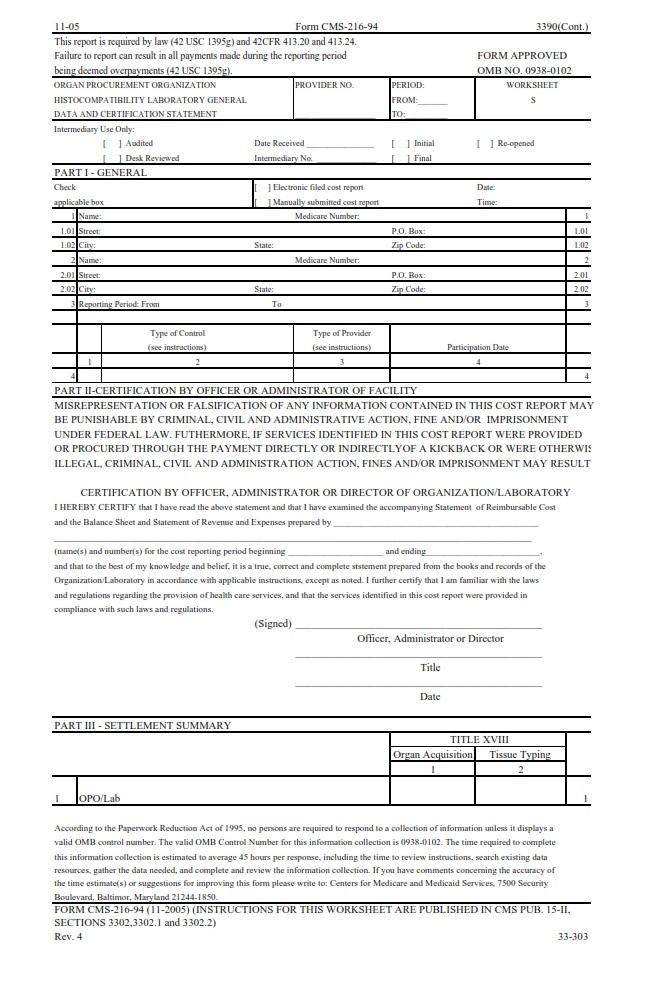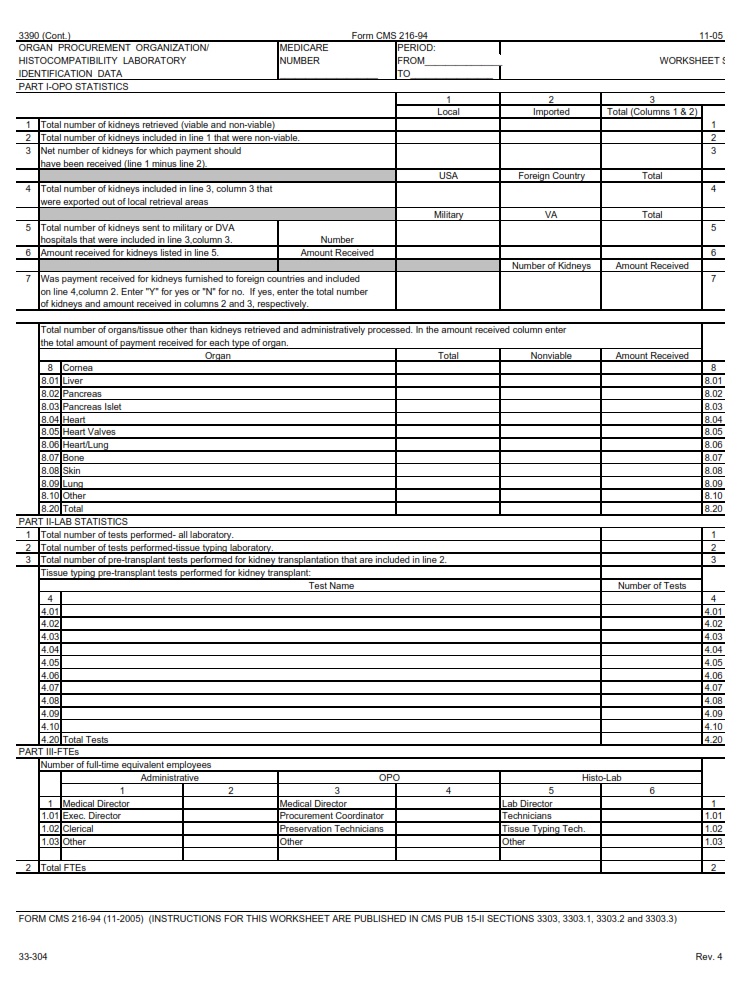CMSFORM.ORG – CMS 216 – ORGAN PROCUREMENT ORGANIZATION-HISTO-COMPATIBILITY LAB STATEMENT OF REIMBURSABLE COSTS – As advancements in medical science continue to push the boundaries of what is possible, the field of organ transplantation stands at the forefront of innovation and hope. Central to this process is the crucial role played by Organ Procurement Organizations (OPOs) and their Histo-Compatibility Labs, which ensure that donated organs find suitable matches for recipients in need. The CMS 216 form serves as a vital tool in this intricate dance of life-saving procedures, providing transparency on the reimbursable costs associated with these essential services.
Imagine a world where every individual in need of a life-saving organ transplant could swiftly find a compatible donor match, thanks to meticulous testing and analysis conducted by dedicated professionals within Histo-Compatibility Labs. The complexities and intricacies involved in this process highlight the critical importance of understanding the detailed breakdown of reimbursable costs outlined in the CMS 216 form. Join us as we delve into the fascinating world of organ procurement organizations, uncovering the financial framework that underpins their noble mission of saving lives through successful transplants.
Download CMS 216 – ORGAN PROCUREMENT ORGANIZATION-HISTO-COMPATIBILITY LAB STATEMENT OF REIMBURSABLE COSTS
| Form Number | CMS 216 |
| Form Title | ORGAN PROCUREMENT ORGANIZATION-HISTO-COMPATIBILITY LAB STATEMENT OF REIMBURSABLE COSTS |
| Published | 2005-11-01 |
| O.M.B. | 0938-0102 |
| File Size | 47 KB |
What is a CMS 216?
A CMS 216, also known as the Organ Procurement Organization-Histo-Compatibility Lab Statement of Reimbursable Costs, plays a crucial role in the healthcare industry. This form is used by organ procurement organizations to report their costs related to histocompatibility testing for organ transplants. By providing transparency and accountability in cost reporting, the CMS 216 helps ensure that organ procurement organizations are adequately reimbursed for their services.
Furthermore, the data collected through the CMS 216 form helps stakeholders analyze trends in reimbursement and funding for vital healthcare services. Understanding these financial aspects is essential for maintaining high-quality care in organ transplantation and ensuring equitable access to life-saving treatments. In essence, the CMS 216 serves as a tool that promotes efficiency and fairness within the healthcare system, ultimately benefiting both providers and patients alike.
Where Can I Find a CMS 216?
If you’re looking for a CMS 216 form to access the Organ Procurement Organization-Histo-Compatibility Lab Statement of Reimbursable Costs, you can typically find it online through official government websites or healthcare provider portals. These forms play a crucial role in detailing the costs associated with laboratory services related to organ procurement and transplantation. Some specialized medical supply companies may also offer CMS 216 forms for purchase or download, making them accessible to a wider audience.
Additionally, reaching out directly to organ procurement organizations or healthcare facilities that deal with histocompatibility labs could be another avenue to obtain a CMS 216 form. It’s important to ensure that any form obtained is the most up-to-date version and complies with all regulatory requirements surrounding reimbursable costs in this specialized field. By exploring various channels and resources, individuals seeking this specific document can navigate the process more efficiently and effectively.
CMS 216 – ORGAN PROCUREMENT ORGANIZATION-HISTO-COMPATIBILITY LAB STATEMENT OF REIMBURSABLE COSTS
In the complex landscape of organ procurement, the Histo-Compatibility Lab plays a pivotal role in ensuring successful transplant outcomes. The State of Reimbursable Costs associated with CMS 216 sheds light on the financial considerations underpinning this critical aspect of organ donation and transplantation. By delineating costs incurred in histocompatibility testing and related services, organizations can navigate the intricacies of reimbursement processes more efficiently.
Furthermore, understanding the nuances of reimbursable costs enhances transparency and accountability within organ procurement organizations. It underscores the importance of accurate cost reporting to optimize resource allocation and streamline operations. This comprehensive approach fosters a culture of fiscal responsibility while bolstering organizational resilience in delivering life-saving services to patients in need.

